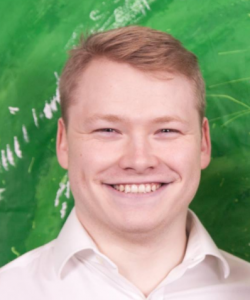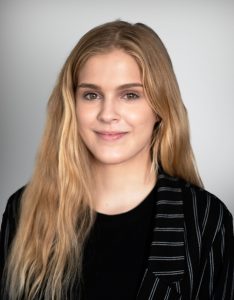Interview: Benedikt H Þórðarson
 Tell us about yourself, your education and your background.
Tell us about yourself, your education and your background.
My name is Benedikt and I am doing my MSc in computer science. I got my BSc in computer science from Reykjavik University.
What led you into the field of sleep studies?
I chose to do my MSc with Dr. Jacqueline C. Mallett, and she had a funded project in collaboration with NOX Medical.
Tell us about your project.
I am teaching a computer how to separate a signal into breath-by-breath segments, and then to recognize whether a given breath is happening during an apnea or not.
Have you faced any challenges during your project? Anything surprising that you have discovered?
It’s been mostly smooth sailing for me, but the data I am working with is very messy and it can be difficult to work with. This is also a very active field of research, and this marriage of computer science, machine-learning and AI and sleep research is still in its infancy, thus there is not very much information on ‘how to do things correctly’.
What role did RUSI play in your project?
Providing experts that helped immensely with both learning the basics of sleep, the meaning of signals, and how the medical community interprets certain events during sleep has been one of the biggest factors in helping me achieve the results that I have.
What have you learned from your project?
Just how immensely complex the field of sleep is, and how we’ve just scratched the surface of what is possible to achieve just by being a little imaginative.
Anything else you would like to add?
If anyone is looking to break into a field, I think that there is a lot of opportunity to achieve great things in sleep research. Literally every thing that has more than 2 cells sleeps in some form, and any light we can shed into what’s going on with this state in which we spend 1/3 of our life in is possibly a great service to humanity.
Interview: Birta Sóley Árnadóttir, student in BSc. in psychology
 Tell us about yourself, your education and your background.
Tell us about yourself, your education and your background.
My name is Birta Sóley and I am finishing my second year (BSc) in psychology at Reykjavík University.
What led you into the field of sleep studies?
I have always found sleep to be an important and interesting aspect of our lives. However, I became interested in working in this field after Dr. Erna Sif Arnardóttir taught at our biology class, as a guest lecturer. She taught us about the importance of sleep and what is happening in our bodies during this state. Erna also told us about various sleep disorders and informed us that pulling an all nighter, the night before an exam, will most likely do more harm than good. I found her lectures very interesting and wanted to know what it is like to work in this field. I contacted Erna, who has been very supportive and taught me a lot ever since.
Tell us about your research.
We are researching the effect of sleep deprivation and recovery sleep on cognitive performance. Participants are kept awake for 36 hours and perform various tests and questionnaires during these 36 hours. A similar research has never been performed in Iceland before, so its results are highly valuable. This is a big step in raising awareness of the importance of sleep in Iceland, as Iceland has the highest percentage of shift workers in Scandinavia, according to Statisics Iceland. It is important to know the consequences of sleep deprivation and inform people about it.
Have you faced any challenges during your research? Anything surprising that you have discovered?
The research has taken more time than we initially planned, due to the Covid-19 pandemic. Therefore, we have got more time to prepare for the research, which has gone well.
What role did RUSI play in your research?
RUSI monitors the set up of all the equipment for measuring sleep and the tests. RUSI also carries out the results of these measurements and tests.
What have you learned from your research?
I have learned so much from my instructors and from working on this research. I have gotten the opportunity to use the knowledge I have acquired through my first year in psychology at RU and expanded that knowledge a lot. I have learned how to work with sleep equipment and implement cognitive tests. I have also learned a great deal about sleep and cognitive function.
Anything else you would like to add?
I want to thank my instructors for the opportunity and for the guidance they have given me throughout the whole process.
Interview: Carmen Maja Valencia
Tell us about yourself, your education, and your background.
My name is Carmen. I am 32 years old and live in Kópavogur with my fiancé and two daughters. I work as a psychologist at Auðnast where I
What led you into the field of sleep studies? (answer if applicable)
Since I started my undergraduate studies, my interest has focused on health psychology and all the aspects of our lives, how we behave, eat and exercise, that directly affect our mental and physical health. At that time, I had never been particularly interested in sleep, but it should be noted that I had never received any instruction or instruction on the importance of sleep. When I started my master’s studies at RU, it soon came to choosing a subject for my final project. The selection was made so that my fellow students and I received a full day of presentations from psychologists and other specialists who told us what they were researching, or wanted to research, and asked for a master’s student to join them. Erna Sif came and gave a presentation on a pediatric study she was setting up where she planned to examine children’s sleep apnea and wanted to get a psychology student on board who could examine the children’s mental well-being in the study. After that presentation, it can be said that there has been no turning back. I’ve been pretty sleepy ever since.
Tell us about your research/project.
This was a child study where my part was to look at the connection between snoring and suffocation in 8 to 14-year-old children and behavioral and emotional problems on the one hand and schooling on the other. The study was carried out in such a way that the children brought home sleep measuring equipment for one night where various aspects of their sleep were examined. For example, the number of breath stops was measured as well as the sound recording of snoring. The children’s parents were asked to answer questionnaires regarding the child’s sleep quality as well as a list that assessed his behavioral and emotional problems in comparison with other children of the same age. Consent was also requested to obtain information regarding the rate of standardized tests in 4th grade (as most of the children had in common that they had completed those tests).
Have you faced any challenges during your research/project? Anything surprising that you have discovered?
Overall, the project went well. It was nice to see how willing the children and their parents were to participate in the study with us and were often very interested in what we were doing. It was also a lot of fun to work out the results and start looking at those relationships that we were interested in. Of course, we had a goal of reaching a certain number of participants that we did not succeed in, but I think that is usually part of doing research on people.
It was certainly a lot of work to do such a study, but my idea of similar research has changed enormously after participating in this one. There are so many things to keep in mind that you may not realize at first. For example, when working with children, issues such as obtaining informed consent to participate or obtaining various personal information can be extremely complex. It was also a challenge to book participants in measurements, as it was always necessary to find a time that suited the parent and even the child. It could happen that the parent had booked an appointment for the measurement but the child did not want to participate at all. In the end, however, it was a good feeling to see everything click together and start working on the results.
What role did RUSI play in your research/project?
The RUSI had not been set up when our study began, but Erna and her colleagues were working on it at the same time as we were beginning our study. I think it would have changed a lot to have had the opportunity to use the Sleep Center, but all our measurements took place at the Children’s Hospital as we had no other option.
What have you learned from your research/project?
Absolutely amazing! I think I have learned a lot from Erna, both in terms of sleep research and what lives in a good researcher. This is the first time I am involved in submitting an application to the Science Ethics Committee, applying for all kinds of grants for the project, and booking participants. I also got to know a lot of great people, but the experience of being a part of such a large study, which involves so many different experts, is invaluable. What I learned, perhaps, first and foremost, is that sleep research belongs to so many professions, from biologists to psychologists and even engineers.
Anything else you would like to add?
Congratulations to everyone who helped make the RUSI a possibility! It will be exciting to watch the sequel.
